
cloudberrydb
Cloudberry Database - Open source alternative to Greenplum Database. Created by the original Greenplum developers.
Stars: 313
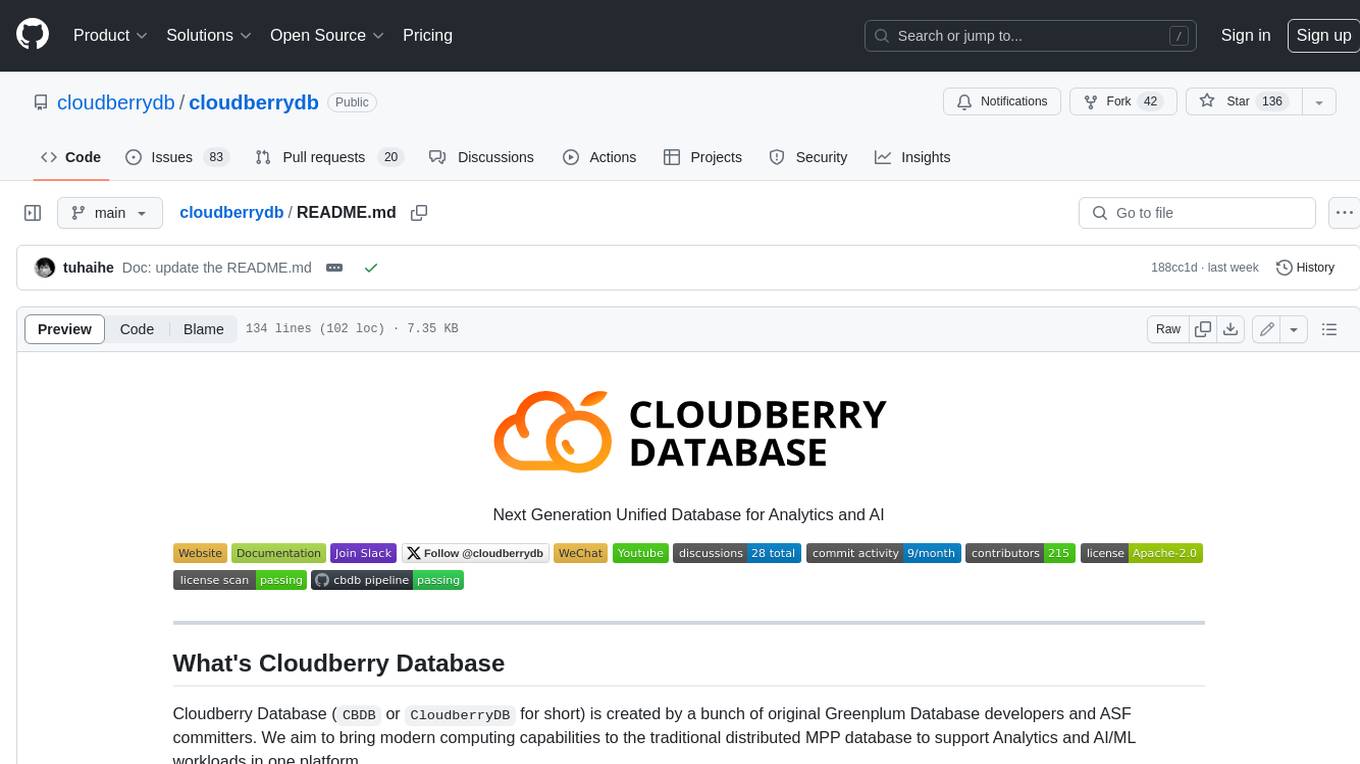
Cloudberry Database (CBDB or CloudberryDB) is a next-generation unified database for analytics and AI. It is created by a bunch of original Greenplum Database developers and ASF committers. Cloudberry Database aims to bring modern computing capabilities to the traditional distributed MPP database to support Analytics and AI/ML workloads in one platform.
README:
Next Generation Unified Database for Analytics and AI
Cloudberry Database (CBDB or CloudberryDB for short) is created by a bunch
of original Greenplum Database developers and ASF committers. We aim to bring
modern computing capabilities to the traditional distributed MPP database to
support Analytics and AI/ML workloads in one platform.
As a derivative of Greenplum Database 7, Cloudberry Database is compatible with Greenplum Database, but it's shipped with a newer PostgreSQL 14.4 kernel (scheduled kernel upgrade yearly) and a bunch of features Greenplum Database lacks or does not support. View the Cloudberry Database vs Greenplum Database doc for details.
You can check our Cloudberry Database Roadmap 2024 out to see the product plans and goals we want to achieve in 2024. Welcome to share your thoughts and ideas to join us in shaping the future of the Cloudberry Database.
You can follow these guides to build the Cloudberry Database on Linux OS(including CentOS, RHEL/Rocky Linux, and Ubuntu) and macOS.
Welcome to try out Cloudberry Database via building one Docker-based Sandbox, which is tailored to help you gain a basic understanding of Cloudberry Database's capabilities and features a range of materials, including tutorials, sample code, and crash courses.
This is the main repository for Cloudberry Database. Alongside this, there are several ecosystem repositories for the Cloudberry Database, including the website, extensions, connectors, adapters, and other utilities.
- cloudberrydb/cloudberrydb-site: website and documentation sources.
- cloudberrydb/bootcamp: help you quickly try out Cloudberry Database via one Docker-based Sandbox.
- cloudberrydb/gpbackup: backup utility for Cloudberry Database.
- cloudberrydb/gp-common-go-libs: gp-common-go-libs for Cloudberry Database.
- cloudberrydb/gpbackup-s3-plugin: S3 plugin for use with Cloudberry Database backup utility.
- cloudberrydb/filedump: format heap/index/control files into a human-readable form.
- cloudberrydb/postgis: PostGIS for Cloudberry Database.
- cloudberrydb/pxf: Platform Extension Framework (PXF) for Cloudberry Database.
- cloudberrydb/madlib: MADlib® for Cloudberry Database.
- cloudberrydb/plr: PL/R for Cloudberry Database.
- cloudberrydb/pljava: PL/Java for Cloudberry Database.
- More is coming...
We have many channels for community members to discuss, ask for help, feedback, and chat:
| Type | Description |
|---|---|
| Slack | Click to Join the real-time chat on Slack for QA, Dev, Events, and more. Don't miss out! Check out the Slack guide to learn more. |
| Q&A | Ask for help when running/developing Cloudberry Database, visit GitHub Discussions - QA. |
| New ideas / Feature Requests | Share ideas for new features, visit GitHub Discussions - Ideas. |
| Report bugs | Problems and issues in Cloudberry Database core. If you find bugs, welcome to submit them here. |
| Report a security vulnerability | View our security policy to learn how to report and contact us. |
| Community events | Including meetups, webinars, conferences, and more events, visit the Events page and subscribe events calendar. |
| Documentation | Official documentation for Cloudberry Database. You can explore it to discover more details about us. |
When you are involved, please follow our community Code of Conduct to help create a safe space for everyone.
We believe in the Apache Way "Community Over Code" and we want to make Cloudberry Database a community-driven project.
Contributions can be diverse, such as code enhancements, bug fixes, feature proposals, documents, marketing, and so on. No contribution is too small, we encourage all types of contributions. Cloudberry Database community welcomes contributions from anyone, new and experienced! Our contribution guide will help you get started with the contribution.
| Type | Description |
|---|---|
| Code contribution | Learn how to contribute code to the Cloudberry Database, including coding preparation, conventions, workflow, review, and checklist following the code contribution guide. |
| Submit the proposal | Proposing major changes to Cloudberry Database through proposal guide. |
| Doc contribution | We need you to join us to help us improve the documentation, see the doc contribution guide. |
Thanks to all the people who already contributed!
Please note that the images shown above highlight the avatars of our active and upstream contributors while not including anonymous contributors. To view all the contributors, you can click on the images.
Thanks to PostgreSQL, Greenplum Database and other great open source projects to make Cloudberry Database has a sound foundation.
Cloudberry Database is released under the Apache License, Version 2.0.
For Tasks:
Click tags to check more tools for each tasksFor Jobs:
Alternative AI tools for cloudberrydb
Similar Open Source Tools

cloudberrydb
Cloudberry Database (CBDB or CloudberryDB) is a next-generation unified database for analytics and AI. It is created by a bunch of original Greenplum Database developers and ASF committers. Cloudberry Database aims to bring modern computing capabilities to the traditional distributed MPP database to support Analytics and AI/ML workloads in one platform.
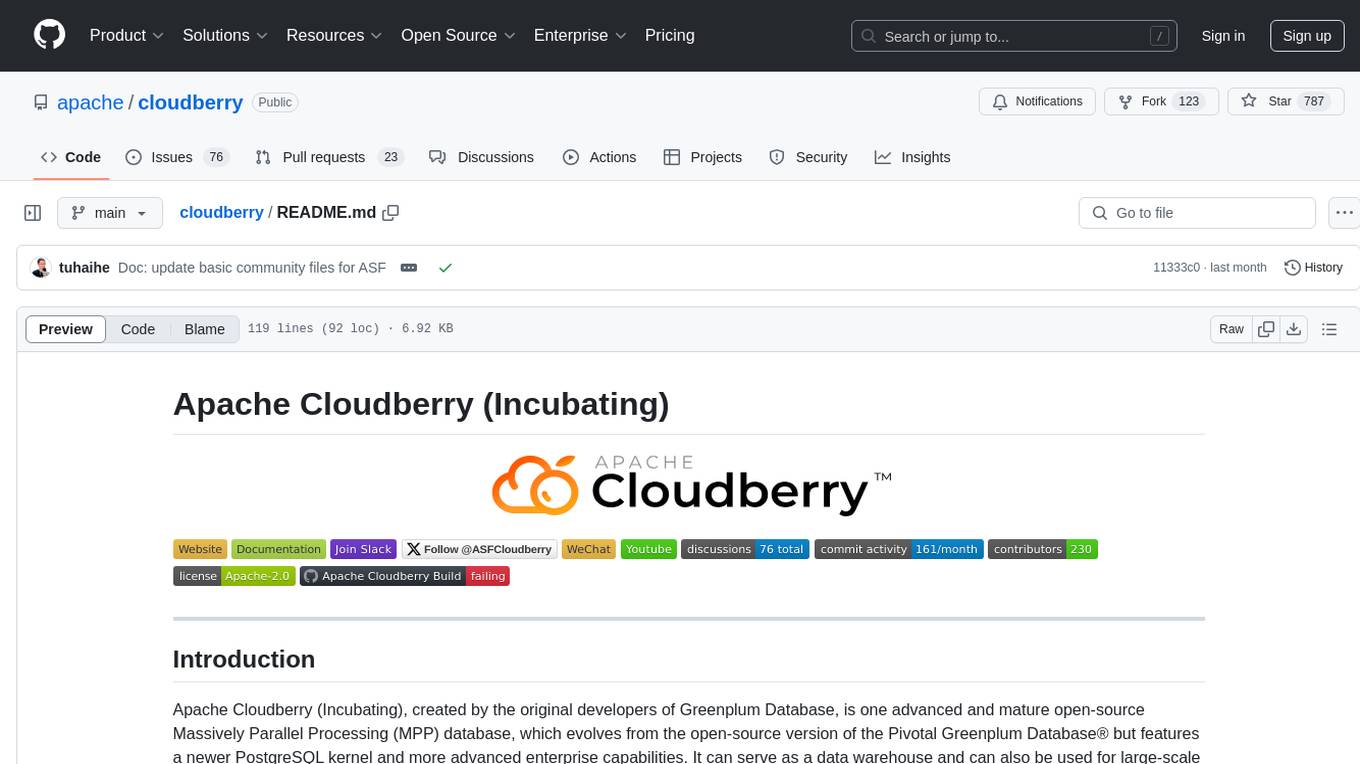
cloudberry
Apache Cloudberry (Incubating) is an advanced and mature open-source Massively Parallel Processing (MPP) database, evolving from the open-source version of the Pivotal Greenplum Database®️. It features a newer PostgreSQL kernel and advanced enterprise capabilities, serving as a data warehouse for large-scale analytics and AI/ML workloads. The main repository includes ecosystem repositories for the website, extensions, connectors, adapters, and utilities.
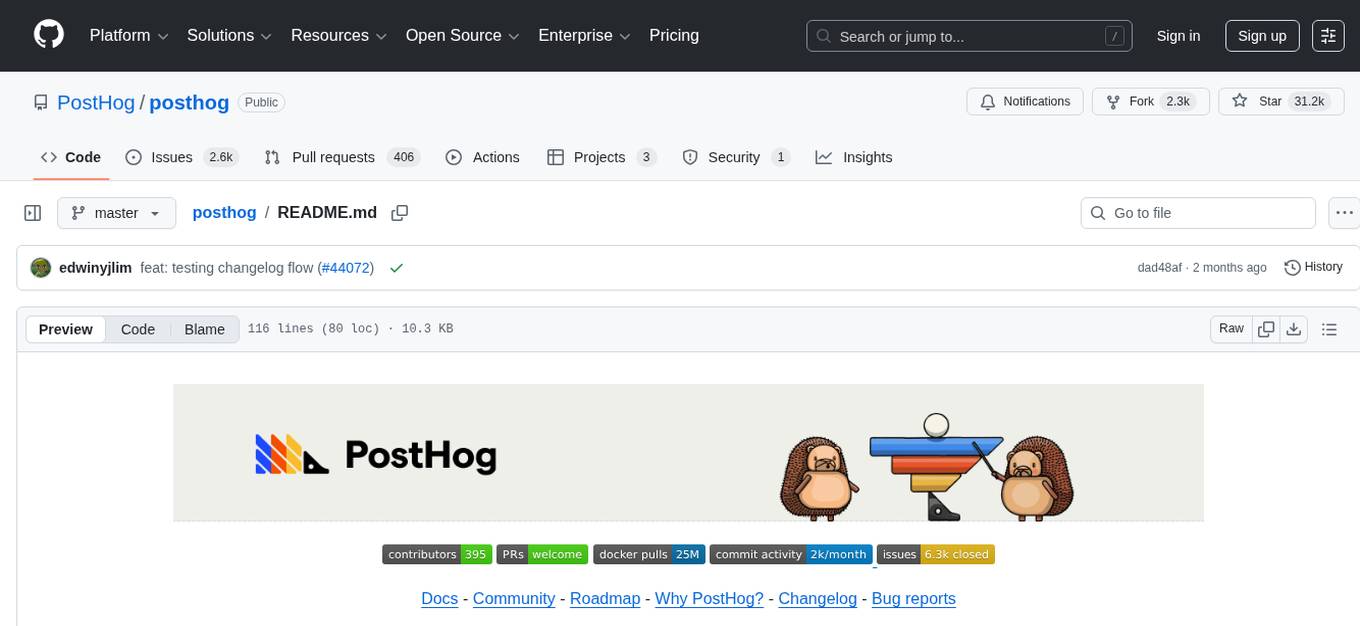
posthog
PostHog is an all-in-one, open source platform for building successful products. It provides tools for product analytics, web analytics, session replays, feature flags, experiments, error tracking, surveys, data warehouse, data pipelines, LLM analytics, and workflows. Users can get started with a generous free tier, self-host the platform, or use PostHog Cloud. The platform supports various SDKs and libraries for popular languages and frameworks, making it versatile and easy to integrate. PostHog is suitable for teams looking to understand user behavior, improve product performance, and automate actions or messages to users.
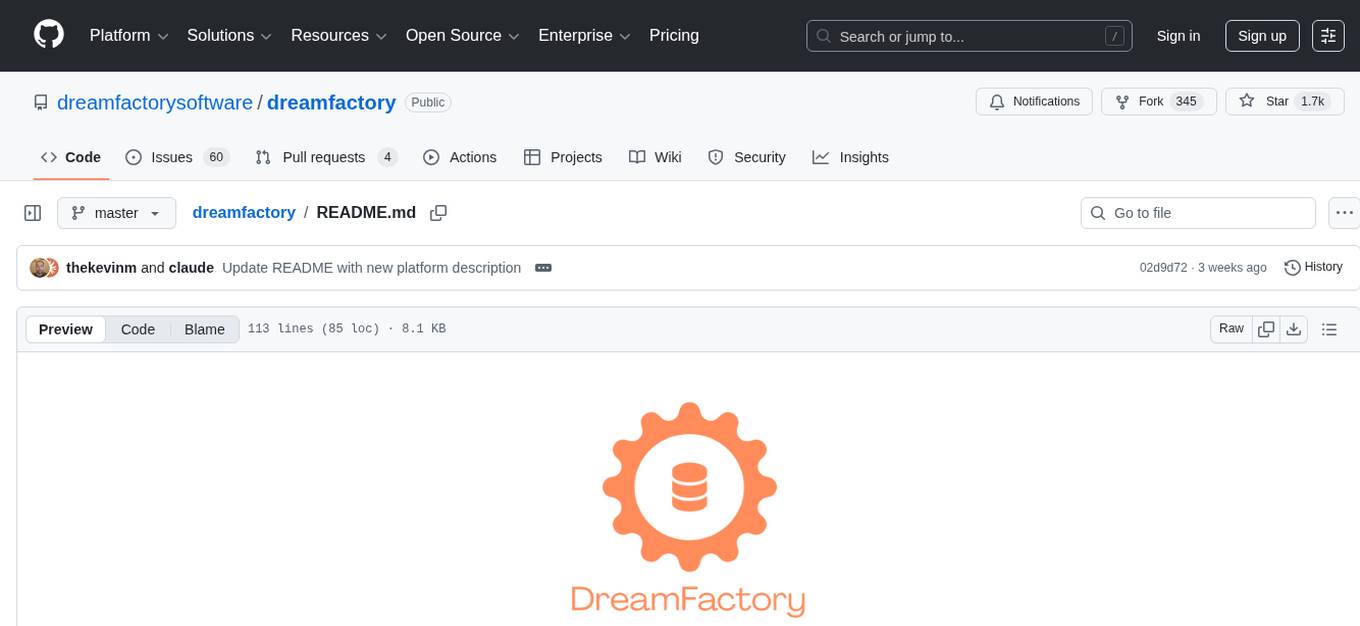
dreamfactory
DreamFactory is a self-hosted platform that provides governed API access to any data source for enterprise apps and local LLMs. It is a secure enterprise data access platform built on top of the Laravel framework, offering role-based access control, identity passthrough, and customization of API behavior using PHP, Python, and NodeJS scripting languages. DreamFactory allows users to generate powerful APIs for SQL and NoSQL databases, files, email, and push notifications in seconds, while ensuring security with features like user management, SSO authentication, OAuth, and Active Directory integration.

classifai
Supercharge WordPress Content Workflows and Engagement with Artificial Intelligence. Tap into leading cloud-based services like OpenAI, Microsoft Azure AI, Google Gemini and IBM Watson to augment your WordPress-powered websites. Publish content faster while improving SEO performance and increasing audience engagement. ClassifAI integrates Artificial Intelligence and Machine Learning technologies to lighten your workload and eliminate tedious tasks, giving you more time to create original content that matters.
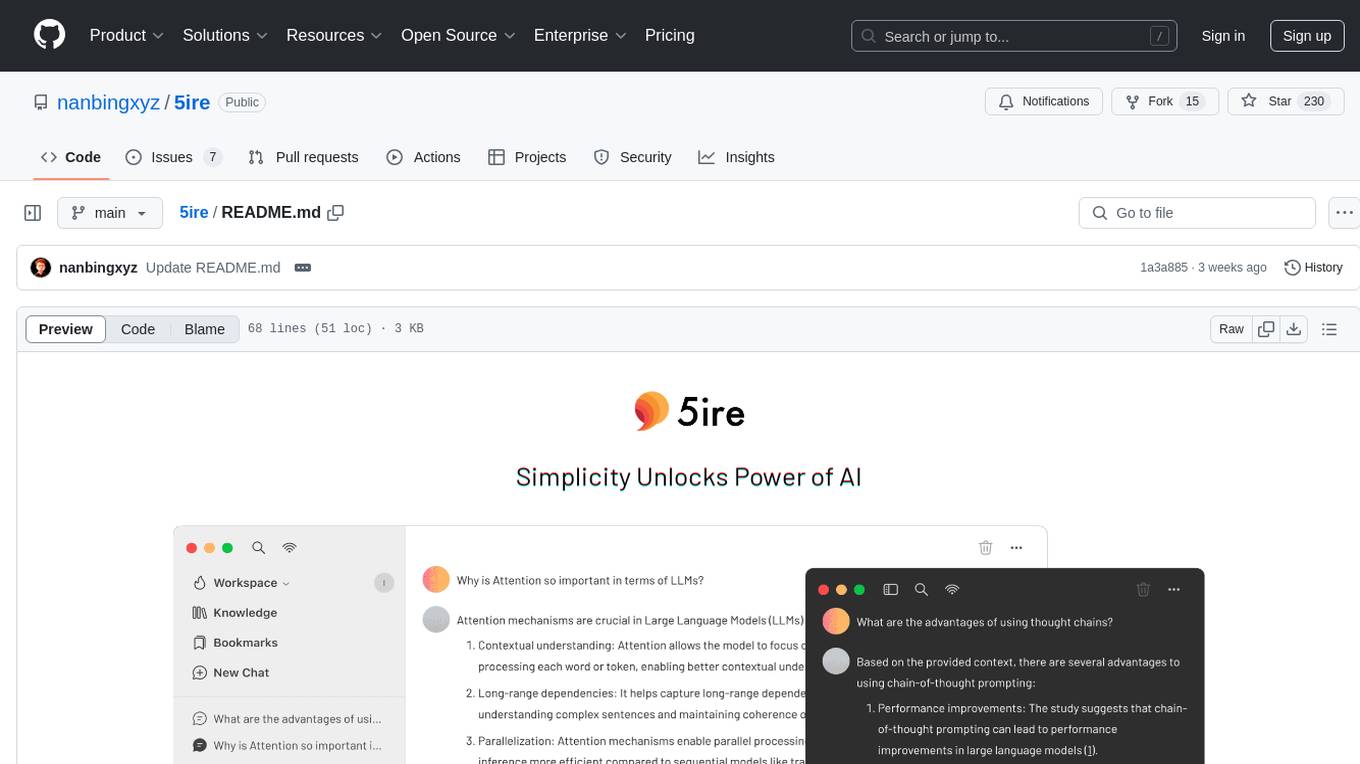
5ire
5ire is a cross-platform desktop client that integrates a local knowledge base for multilingual vectorization, supports parsing and vectorization of various document formats, offers usage analytics to track API spending, provides a prompts library for creating and organizing prompts with variable support, allows bookmarking of conversations, and enables quick keyword searches across conversations. It is licensed under the GNU General Public License version 3.

buildel
Buildel is an AI automation platform that empowers users to create versatile workflows without writing code. It supports multiple providers and interfaces, offers pre-built use cases, and allows users to bring their own API keys. Ideal for AI-powered document retrieval, conversational interfaces, and data integration. Users can get started at app.buildel.ai or run Buildel locally with Node.js, Elixir/Erlang, Docker, Git, and JQ installed. Join the community on Discord for support and discussions.
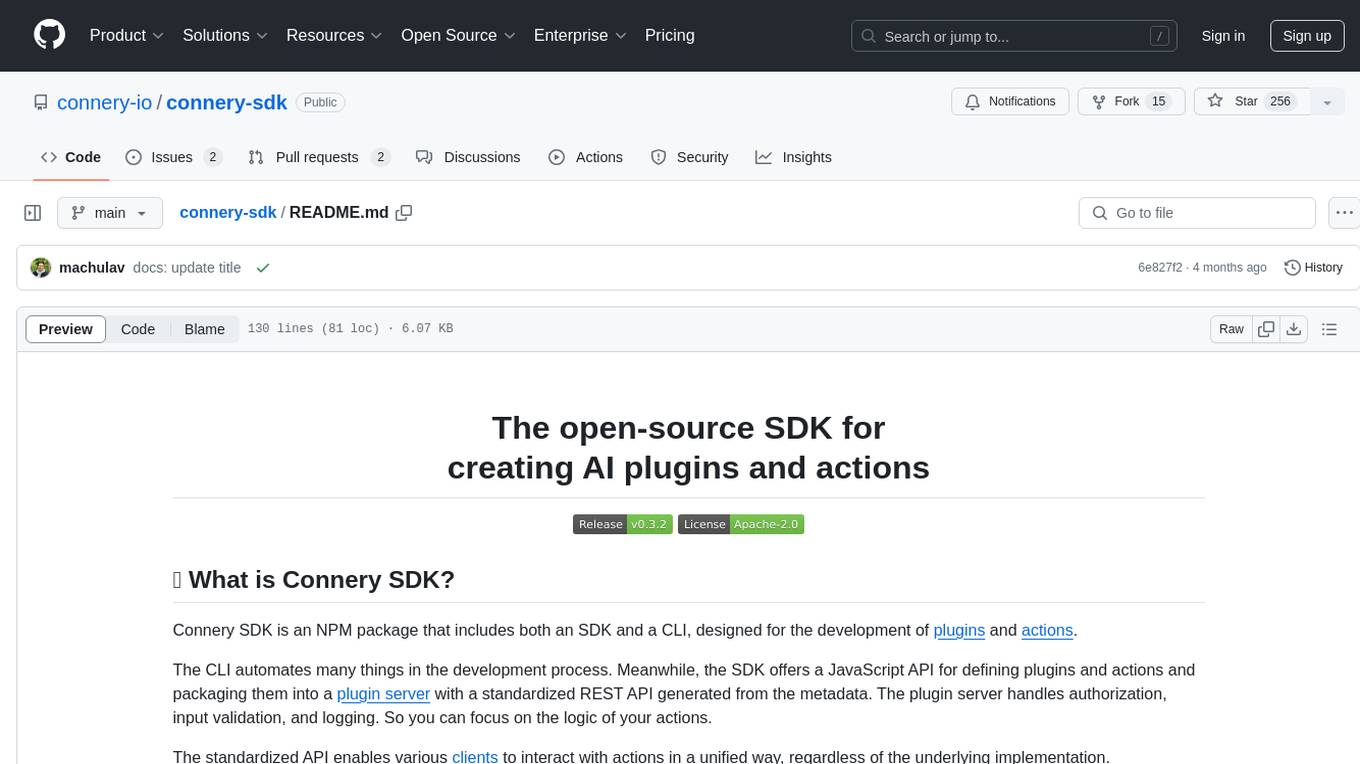
connery-sdk
Connery SDK is an open-source NPM package that provides an SDK and CLI for developing plugins and actions. The SDK offers a JavaScript API to define plugins and actions, which are then packaged into a plugin server with a standardized REST API. This enables automation in the development process and simplifies handling authorization, input validation, and logging. Users can focus on the logic of their actions while the standardized API allows various clients to interact with actions uniformly. Actions can communicate with external APIs, databases, or services, making it versatile for creating AI plugins and actions.
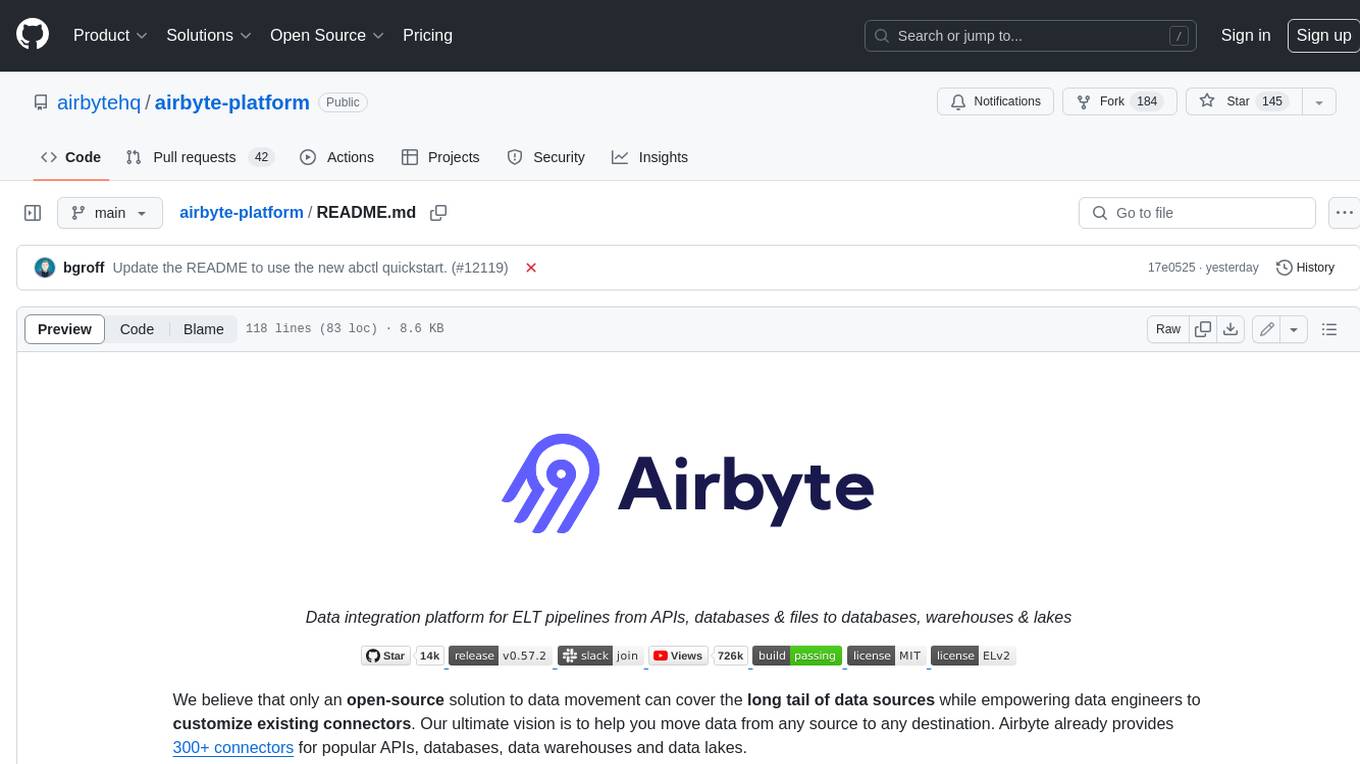
airbyte-platform
Airbyte is an open-source data integration platform that makes it easy to move data from any source to any destination. With Airbyte, you can build and manage data pipelines without writing any code. Airbyte provides a library of pre-built connectors that make it easy to connect to popular data sources and destinations. You can also create your own connectors using Airbyte's low-code Connector Development Kit (CDK). Airbyte is used by data engineers and analysts at companies of all sizes to move data for a variety of purposes, including data warehousing, data analysis, and machine learning.
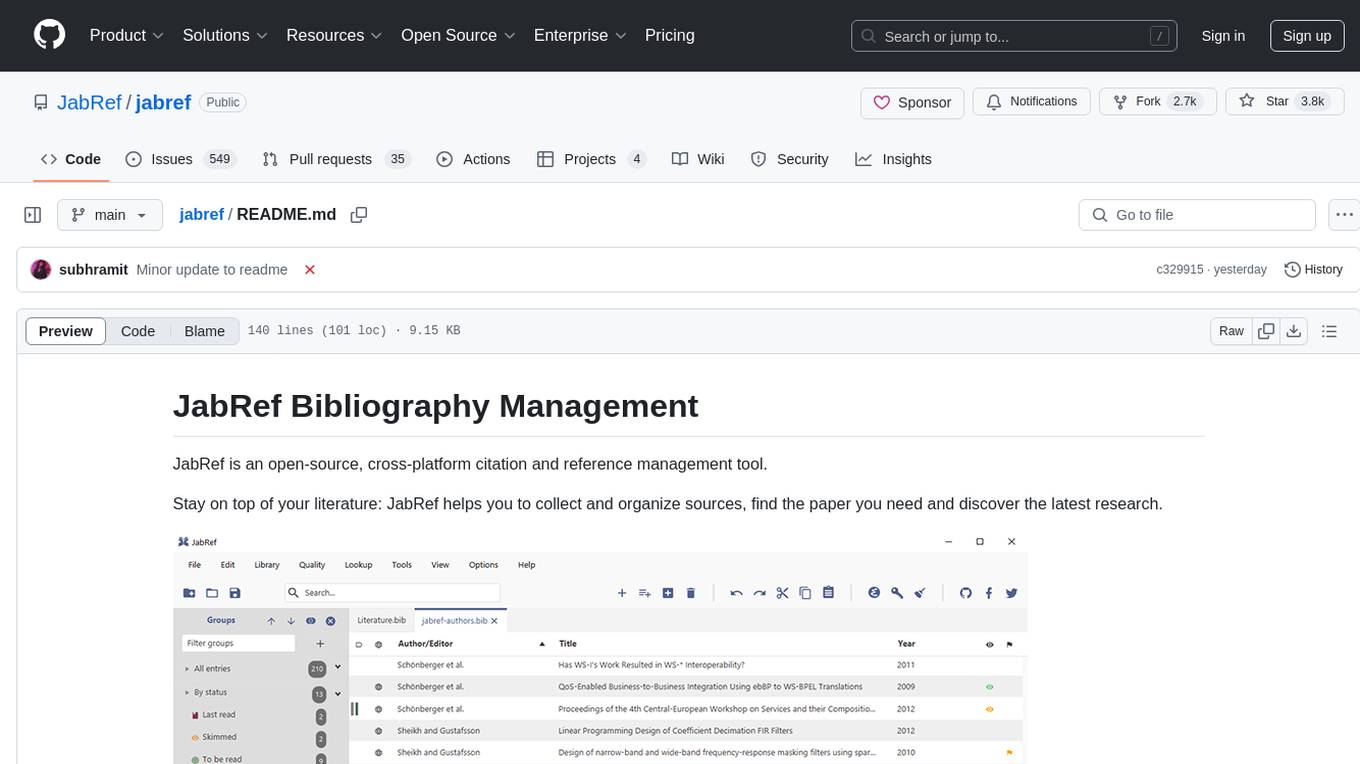
jabref
JabRef is an open-source, cross-platform citation and reference management tool that helps users collect, organize, cite, and share research sources. It offers features like searching across online scientific catalogues, importing references in various formats, extracting metadata from PDFs, customizable citation key generator, support for Word and LibreOffice/OpenOffice, and more. Users can organize their research items hierarchically, find and merge duplicates, attach related documents, and keep track of what they read. JabRef also supports sharing via various export options and syncs library contents in a team via a SQL database. It is actively developed, free of charge, and offers native BibTeX and Biblatex support.
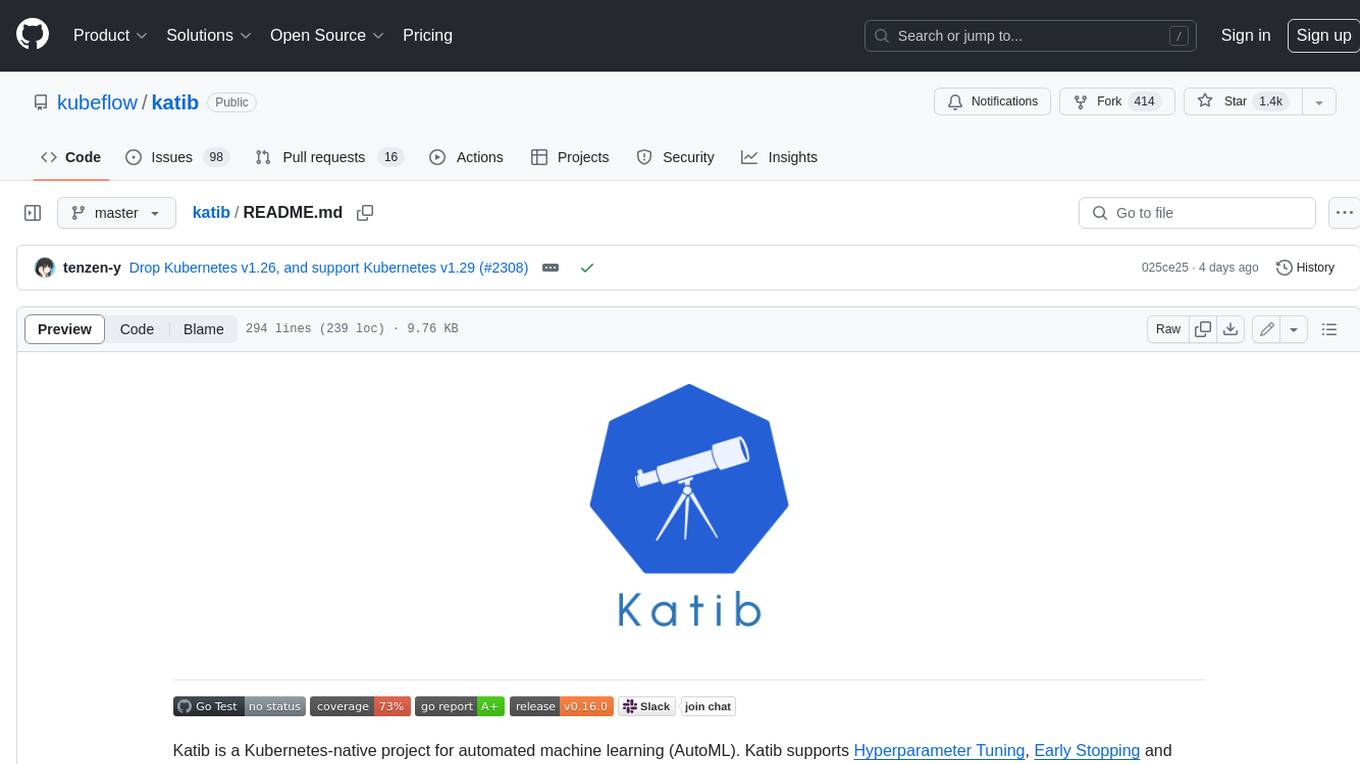
katib
Katib is a Kubernetes-native project for automated machine learning (AutoML). Katib supports Hyperparameter Tuning, Early Stopping and Neural Architecture Search. Katib is the project which is agnostic to machine learning (ML) frameworks. It can tune hyperparameters of applications written in any language of the users’ choice and natively supports many ML frameworks, such as TensorFlow, Apache MXNet, PyTorch, XGBoost, and others. Katib can perform training jobs using any Kubernetes Custom Resources with out of the box support for Kubeflow Training Operator, Argo Workflows, Tekton Pipelines and many more.
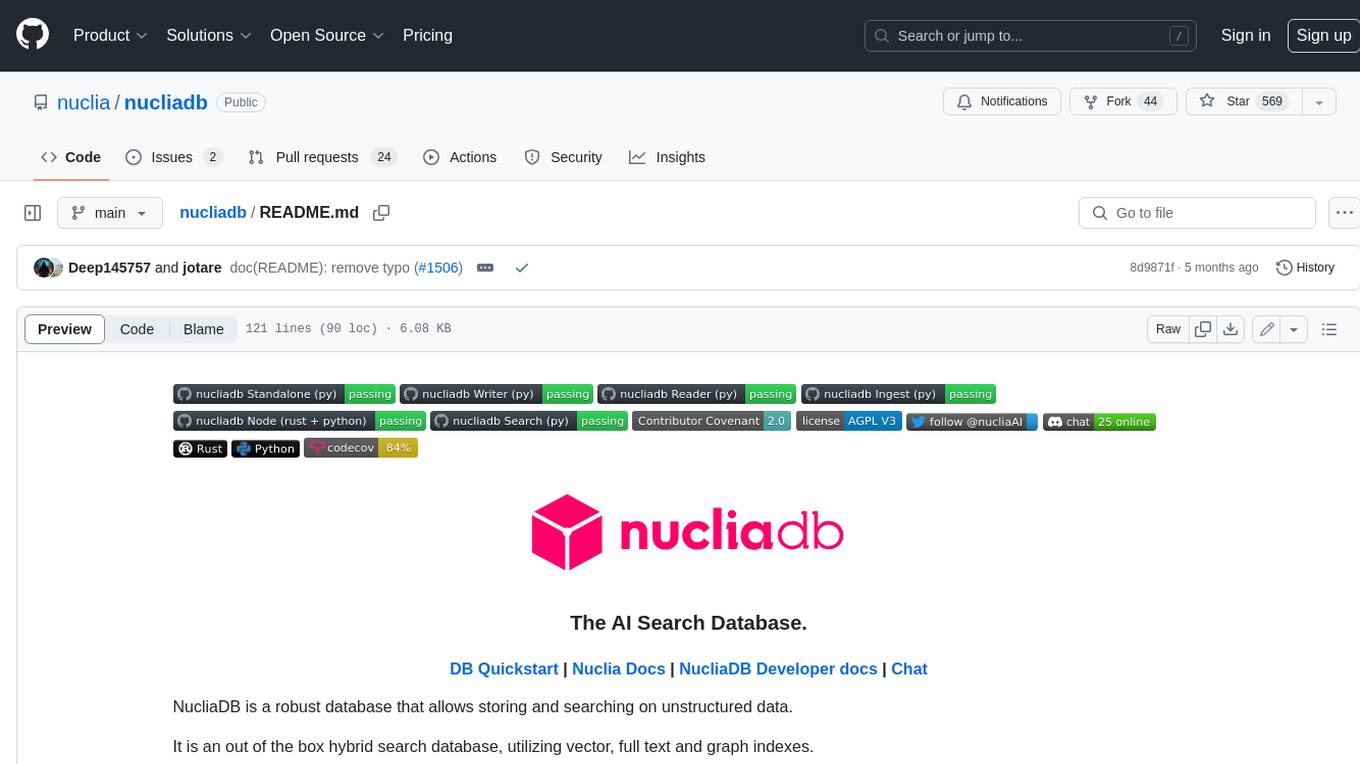
nucliadb
NucliaDB is a robust database that allows storing and searching on unstructured data. It is an out of the box hybrid search database, utilizing vector, full text and graph indexes. NucliaDB is written in Rust and Python. We designed it to index large datasets and provide multi-teanant support. When utilizing NucliaDB with Nuclia cloud, you are able to the power of an NLP database without the hassle of data extraction, enrichment and inference. We do all the hard work for you.
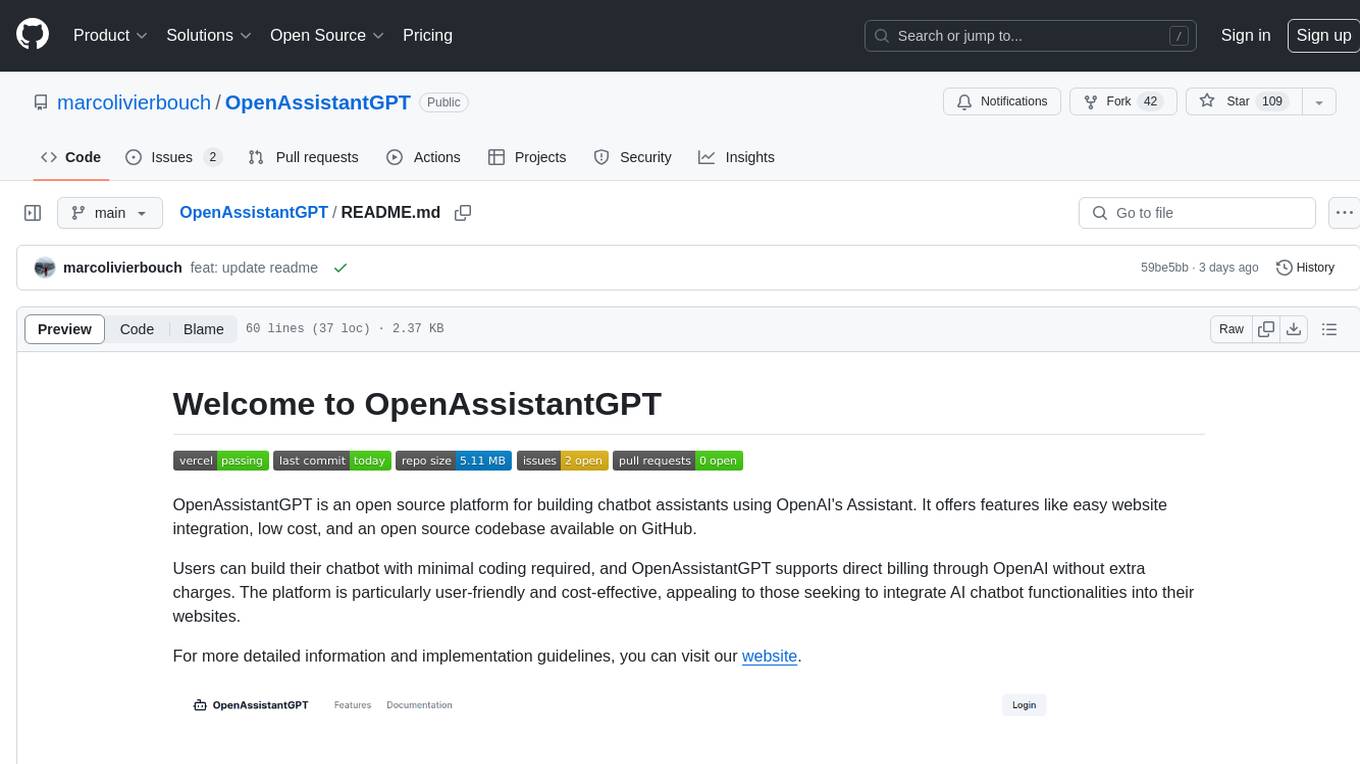
OpenAssistantGPT
OpenAssistantGPT is an open source platform for building chatbot assistants using OpenAI's Assistant. It offers features like easy website integration, low cost, and an open source codebase available on GitHub. Users can build their chatbot with minimal coding required, and OpenAssistantGPT supports direct billing through OpenAI without extra charges. The platform is user-friendly and cost-effective, appealing to those seeking to integrate AI chatbot functionalities into their websites.
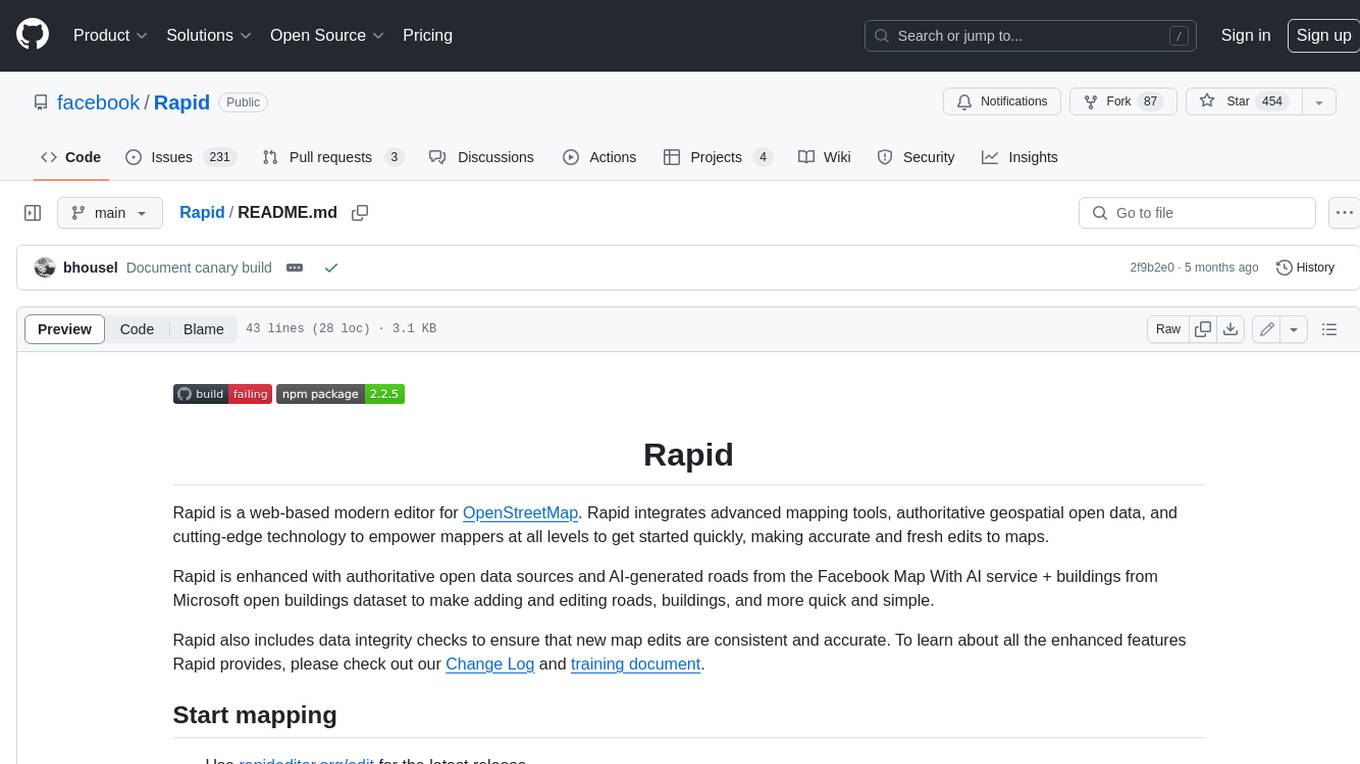
Rapid
Rapid is a web-based modern editor for OpenStreetMap. It integrates advanced mapping tools, authoritative geospatial open data, and cutting-edge technology to empower mappers at all levels to get started quickly, making accurate and fresh edits to maps. Rapid is enhanced with authoritative open data sources and AI-generated roads from the Facebook Map With AI service + buildings from Microsoft open buildings dataset to make adding and editing roads, buildings, and more quick and simple. Rapid also includes data integrity checks to ensure that new map edits are consistent and accurate.

coze-studio
Coze Studio is an all-in-one AI agent development tool that offers the most convenient AI agent development environment, from development to deployment. It provides core technologies for AI agent development, complete app templates, and build frameworks. Coze Studio aims to simplify creating, debugging, and deploying AI agents through visual design and build tools, enabling powerful AI app development and customized business logic. The tool is developed using Golang for the backend, React + TypeScript for the frontend, and follows microservices architecture based on domain-driven design principles.
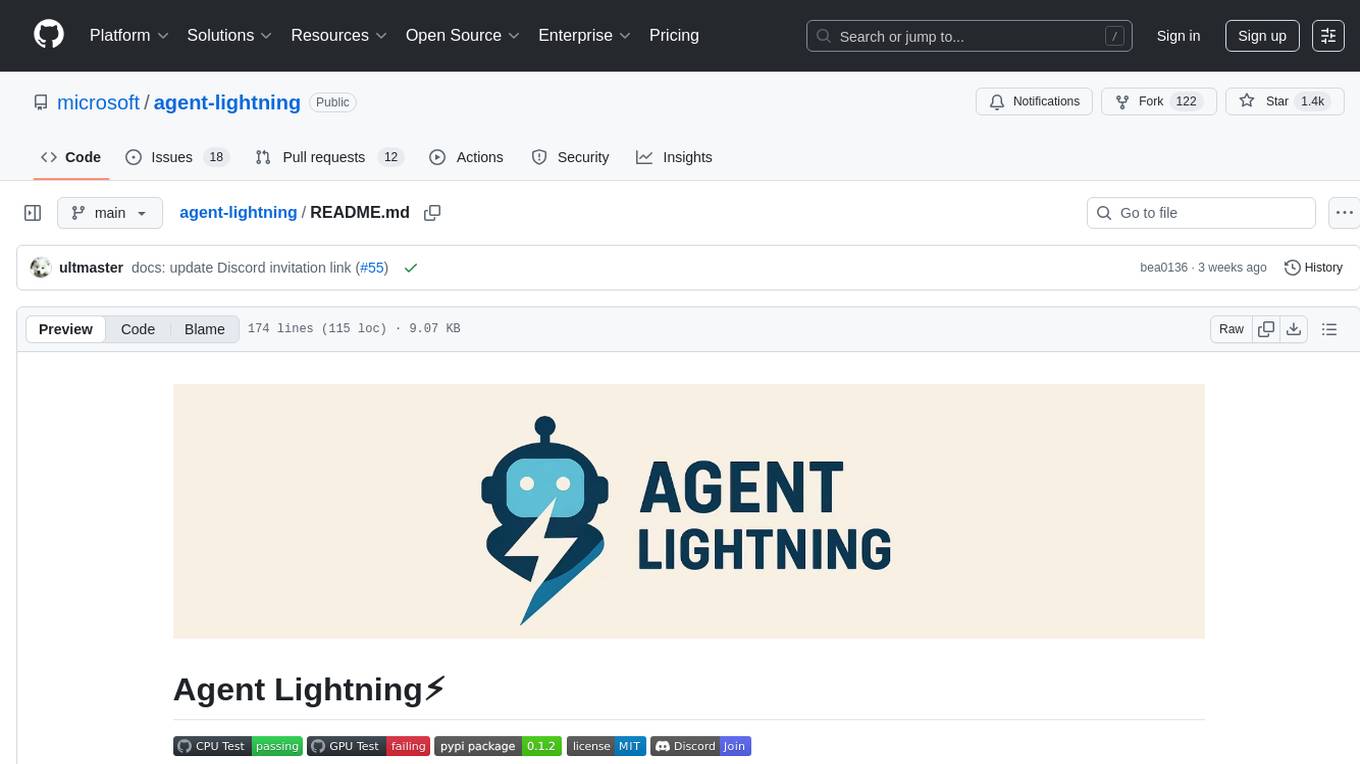
agent-lightning
Agent Lightning is a lightweight and efficient tool for automating repetitive tasks in the field of data analysis and machine learning. It provides a user-friendly interface to create and manage automated workflows, allowing users to easily schedule and execute data processing, model training, and evaluation tasks. With its intuitive design and powerful features, Agent Lightning streamlines the process of building and deploying machine learning models, making it ideal for data scientists, machine learning engineers, and AI enthusiasts looking to boost their productivity and efficiency in their projects.
For similar tasks

Azure-Analytics-and-AI-Engagement
The Azure-Analytics-and-AI-Engagement repository provides packaged Industry Scenario DREAM Demos with ARM templates (Containing a demo web application, Power BI reports, Synapse resources, AML Notebooks etc.) that can be deployed in a customer’s subscription using the CAPE tool within a matter of few hours. Partners can also deploy DREAM Demos in their own subscriptions using DPoC.

sorrentum
Sorrentum is an open-source project that aims to combine open-source development, startups, and brilliant students to build machine learning, AI, and Web3 / DeFi protocols geared towards finance and economics. The project provides opportunities for internships, research assistantships, and development grants, as well as the chance to work on cutting-edge problems, learn about startups, write academic papers, and get internships and full-time positions at companies working on Sorrentum applications.

tidb
TiDB is an open-source distributed SQL database that supports Hybrid Transactional and Analytical Processing (HTAP) workloads. It is MySQL compatible and features horizontal scalability, strong consistency, and high availability.

zep-python
Zep is an open-source platform for building and deploying large language model (LLM) applications. It provides a suite of tools and services that make it easy to integrate LLMs into your applications, including chat history memory, embedding, vector search, and data enrichment. Zep is designed to be scalable, reliable, and easy to use, making it a great choice for developers who want to build LLM-powered applications quickly and easily.

telemetry-airflow
This repository codifies the Airflow cluster that is deployed at workflow.telemetry.mozilla.org (behind SSO) and commonly referred to as "WTMO" or simply "Airflow". Some links relevant to users and developers of WTMO: * The `dags` directory in this repository contains some custom DAG definitions * Many of the DAGs registered with WTMO don't live in this repository, but are instead generated from ETL task definitions in bigquery-etl * The Data SRE team maintains a WTMO Developer Guide (behind SSO)

mojo
Mojo is a new programming language that bridges the gap between research and production by combining Python syntax and ecosystem with systems programming and metaprogramming features. Mojo is still young, but it is designed to become a superset of Python over time.

pandas-ai
PandasAI is a Python library that makes it easy to ask questions to your data in natural language. It helps you to explore, clean, and analyze your data using generative AI.

databend
Databend is an open-source cloud data warehouse that serves as a cost-effective alternative to Snowflake. With its focus on fast query execution and data ingestion, it's designed for complex analysis of the world's largest datasets.
For similar jobs

lollms-webui
LoLLMs WebUI (Lord of Large Language Multimodal Systems: One tool to rule them all) is a user-friendly interface to access and utilize various LLM (Large Language Models) and other AI models for a wide range of tasks. With over 500 AI expert conditionings across diverse domains and more than 2500 fine tuned models over multiple domains, LoLLMs WebUI provides an immediate resource for any problem, from car repair to coding assistance, legal matters, medical diagnosis, entertainment, and more. The easy-to-use UI with light and dark mode options, integration with GitHub repository, support for different personalities, and features like thumb up/down rating, copy, edit, and remove messages, local database storage, search, export, and delete multiple discussions, make LoLLMs WebUI a powerful and versatile tool.

Azure-Analytics-and-AI-Engagement
The Azure-Analytics-and-AI-Engagement repository provides packaged Industry Scenario DREAM Demos with ARM templates (Containing a demo web application, Power BI reports, Synapse resources, AML Notebooks etc.) that can be deployed in a customer’s subscription using the CAPE tool within a matter of few hours. Partners can also deploy DREAM Demos in their own subscriptions using DPoC.

minio
MinIO is a High Performance Object Storage released under GNU Affero General Public License v3.0. It is API compatible with Amazon S3 cloud storage service. Use MinIO to build high performance infrastructure for machine learning, analytics and application data workloads.

mage-ai
Mage is an open-source data pipeline tool for transforming and integrating data. It offers an easy developer experience, engineering best practices built-in, and data as a first-class citizen. Mage makes it easy to build, preview, and launch data pipelines, and provides observability and scaling capabilities. It supports data integrations, streaming pipelines, and dbt integration.

AiTreasureBox
AiTreasureBox is a versatile AI tool that provides a collection of pre-trained models and algorithms for various machine learning tasks. It simplifies the process of implementing AI solutions by offering ready-to-use components that can be easily integrated into projects. With AiTreasureBox, users can quickly prototype and deploy AI applications without the need for extensive knowledge in machine learning or deep learning. The tool covers a wide range of tasks such as image classification, text generation, sentiment analysis, object detection, and more. It is designed to be user-friendly and accessible to both beginners and experienced developers, making AI development more efficient and accessible to a wider audience.

tidb
TiDB is an open-source distributed SQL database that supports Hybrid Transactional and Analytical Processing (HTAP) workloads. It is MySQL compatible and features horizontal scalability, strong consistency, and high availability.

airbyte
Airbyte is an open-source data integration platform that makes it easy to move data from any source to any destination. With Airbyte, you can build and manage data pipelines without writing any code. Airbyte provides a library of pre-built connectors that make it easy to connect to popular data sources and destinations. You can also create your own connectors using Airbyte's no-code Connector Builder or low-code CDK. Airbyte is used by data engineers and analysts at companies of all sizes to build and manage their data pipelines.

labelbox-python
Labelbox is a data-centric AI platform for enterprises to develop, optimize, and use AI to solve problems and power new products and services. Enterprises use Labelbox to curate data, generate high-quality human feedback data for computer vision and LLMs, evaluate model performance, and automate tasks by combining AI and human-centric workflows. The academic & research community uses Labelbox for cutting-edge AI research.









